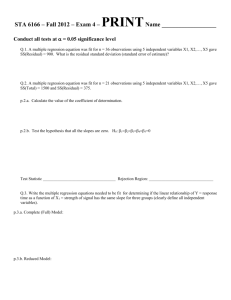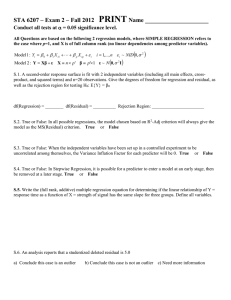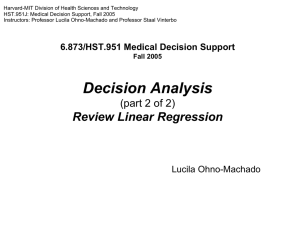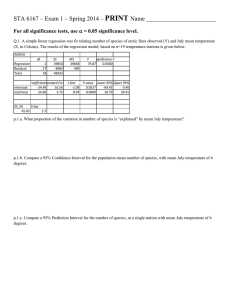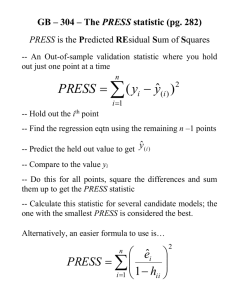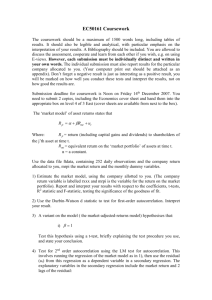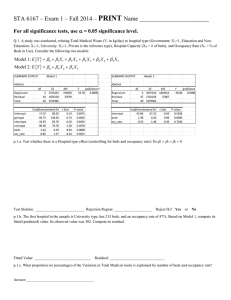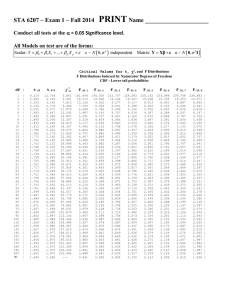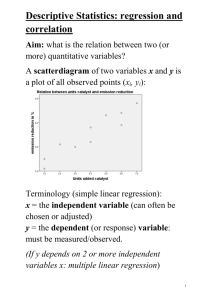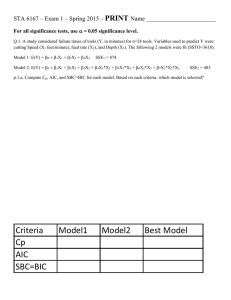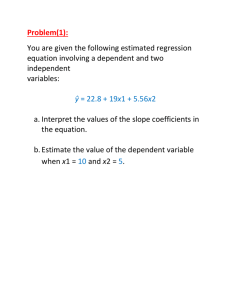Fall 2013
advertisement
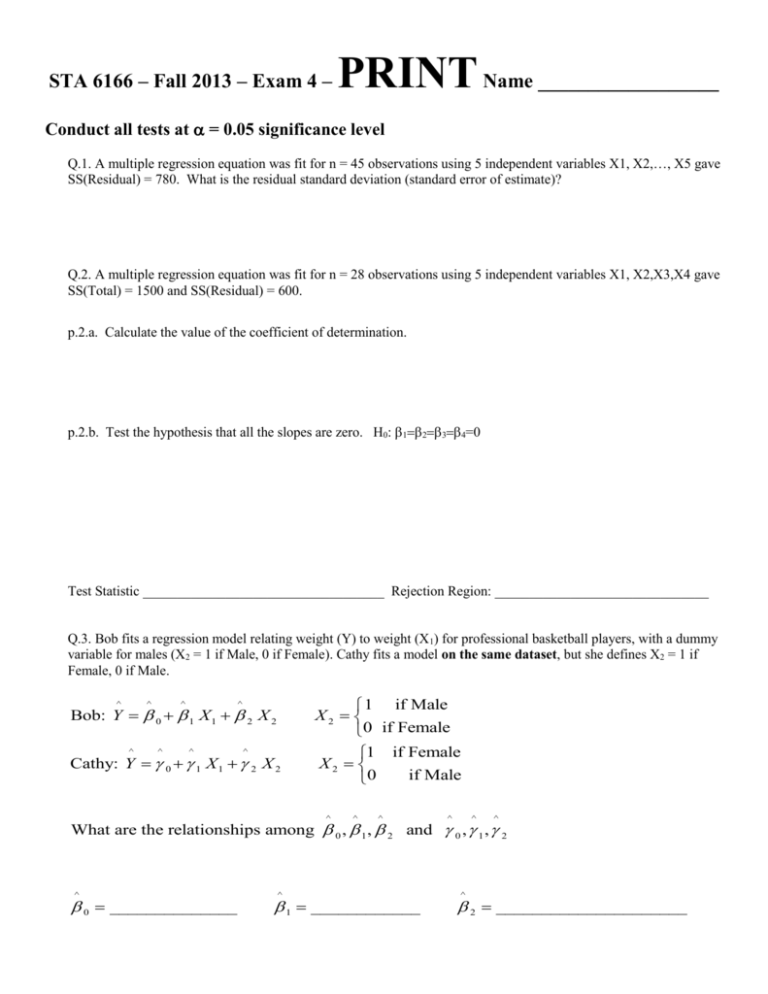
STA 6166 – Fall 2013 – Exam 4 – PRINT Name __________________ Conduct all tests at = 0.05 significance level Q.1. A multiple regression equation was fit for n = 45 observations using 5 independent variables X1, X2,, X5 gave SS(Residual) = 780. What is the residual standard deviation (standard error of estimate)? Q.2. A multiple regression equation was fit for n = 28 observations using 5 independent variables X1, X2,X3,X4 gave SS(Total) = 1500 and SS(Residual) = 600. p.2.a. Calculate the value of the coefficient of determination. p.2.b. Test the hypothesis that all the slopes are zero. H0: =0 Test Statistic ___________________________________ Rejection Region: _______________________________ Q.3. Bob fits a regression model relating weight (Y) to weight (X1) for professional basketball players, with a dummy variable for males (X2 = 1 if Male, 0 if Female). Cathy fits a model on the same dataset, but she defines X2 = 1 if Female, 0 if Male. ^ ^ ^ ^ Bob: Y 0 1 X 1 2 X 2 ^ ^ ^ ^ Cathy: Y 0 1 X 1 2 X 2 1 if Male X2 0 if Female 1 if Female X2 if Male 0 ^ ^ ^ ^ ^ ^ What are the relationships among 0 , 1 , 2 and 0 , 1 , 2 ^ 0 ______________ ^ 1 ____________ ^ 2 _____________________ Q.4. The ANOVA tables for fitting Y as a linear function of X are shown below. In the first table the “independent variables” include X1, the continuous variable, X2 and X3 as dummy variables to denote the three groups, and X12 and X13 representing the cross-products of X1 and the two dummy variables. The second table is the ANOVA table for fitting Y as a linear function of X1, X2, X3. Model 1: Y 0 1 X1 2 X 2 3 X 3 12 X12 13 X13 Model 1:(X1,X2,X3,X12,X13) Source df Regression Error Total 23 Model 2:(X1,X2,X3) Source Regression Error Total Model 2: Y 0 1 X1 2 X 2 3 X 3 SS 32000 40000 df SS 28000 23 40000 p.4.a. Complete the tables. p.4.b. For the second model, test H0 = 0 Test Statistic _______________________________ Rejection Region ______________________________________ p.4.b. Is there significant evidence the slopes are not equal among the 3 groups? H 0 : 12 13 0 Test Statistic _______________________________ Rejection Region ______________________________________ Q.5. In the production of a certain chemical it is believed the yield, Y, can be increased by increasing the amount of a particular catalytic agent. Twenty trials were made with different amounts of the catalyst. Analysis of the yields, measured in grams, and amounts of the catalyst, X, in milligrams gave based on the following model: Y 0 1 X x = 10 ~ N 0, e2 y = 139.0 (x - x)2 = 500 (y -y)2 = 895 (x -x)(y -y) = 350 p.5.a. Compute the estimated slope. p.5.b. Compute the estimated y-intercept. 2 p.5.c. SSE ^ Y Y 650 Compute the estimate of the residual standard deviation: Se p.5.d. Compute a 95% Confidence Interval for 1: Q.6. A regression model was fit, relating revenues (Y) to total cost of production and distribution (X) for a random sample of n=30 RKO films from the 1930s (the total cost ranged from 79 to 1530): n 30 n X 685.2 S xx X i X i 1 2 ^ 6126371 Y 55.23 0.92 X 2 ^ Yi Y i 40067 Se2 i 1 n2 n p.6.a. Obtain a 95% Confidence Interval for the mean revenues for all movies with total costs of x*= 1000 1 1000 685.2 2 Note: 0.0495 6126371 30 ^ y ___________ SE ____________ 95%CI : ___________________________________ ^ p.6.b. Obtain a 95% Prediction Interval for tomorrow’s new film that had total costs of x*= 1000 ^ y ___________ SE ^ ____________ 95%PI : ___________________________________ y
